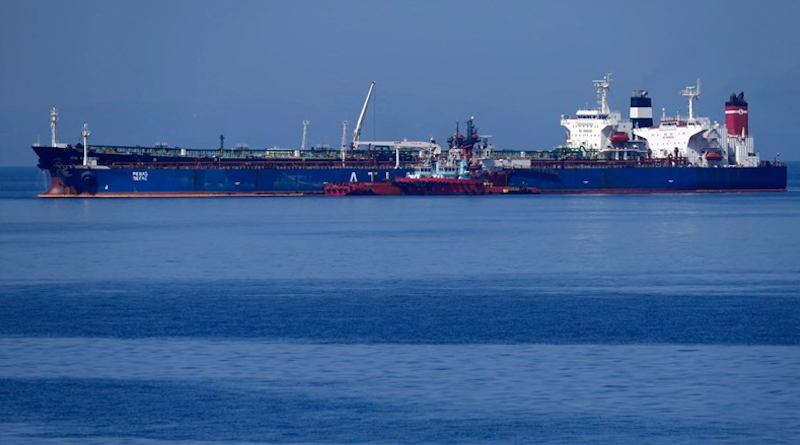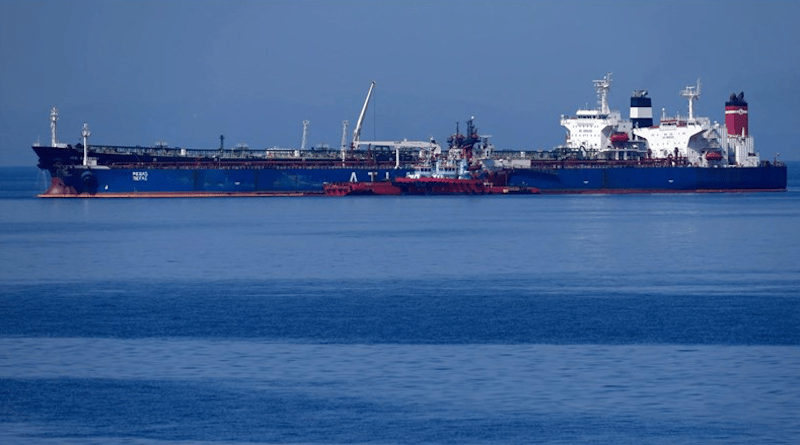4 min read
Iran’s Seizure Of Greek Tankers Threatens Regional Maritime Security
By: Eurasia Review on June 7, 2022 at 8:00 AM

Iran’s Islamic Revolutionary Guard Corps revealed on Friday that it had seized two oil tankers belonging to Greece, which has accused Tehran of piracy for its taking of Delta Poseidon and Prudent Warrior.

In already-jittery energy markets, the attacks have had a destabilizing effect, at least temporarily, leading to a significant spike in oil prices around the world.
The twin attacks, together with other recent threats to freedom of navigation, have highlighted the need to counter Iran’s disruptive conduct and safeguard trade routes and waterways.
The Gulf Cooperation Council and the US are working together to enhance regional maritime security against such threats. In March, the joint GCC-US maritime security working group met in Riyadh to coordinate the two sides’ response to all types of maritime threat. They are also planning additional policy coordination meetings in the near future, while practical cooperation is ongoing under bilateral and other multilateral frameworks, such as the Combined Maritime Forces, which was set up in 2002.

The CMF is a multinational maritime partnership whose express purpose is to “uphold the international rules-based order by countering illicit nonstate actors on the high seas and promoting security, stability and prosperity across approximately 3.2 million square miles of international waters, which encompass some of the world’s most important shipping lanes.”
Its main focus is promoting security, stability and a safe maritime environment. Its mandate also includes combating narcotics, smuggling and piracy, as well as engaging and cooperating with regional and other partners to strengthen and improve its capabilities to achieve those goals. When requested, the CMF will also respond to environmental and humanitarian incidents.
The CMF has 34 member nations: Australia, Bahrain, Belgium, Brazil, Canada, Denmark, Egypt, France, Germany, Greece, Iraq, Italy, Japan, Jordan, the Republic of Korea, Kuwait, Malaysia, the Netherlands, New Zealand, Norway, Pakistan, the Philippines, Portugal, Qatar, Saudi Arabia, the Seychelles, Singapore, Spain, Thailand, Turkey, the UAE, the UK, the US, and Yemen. It is commanded by US Navy Vice Adm. Brad Cooper, who also serves as commander of US Naval Forces Central Command and the US Navy’s Fifth Fleet. All three commands are co-located at US Naval Support Activity Bahrain. The deputy commander is the British Royal Navy’s Commodore Adrian Fryer. Other senior staff roles at CMF headquarters are filled by personnel from member nations.
It has had three combined task forces under its command for some time: CTF 152 deals with maritime security inside the Arabian Gulf; CTF150 deals with maritime security outside the Arabian Gulf; and CTF 151 deals with countering piracy. The CMF last month announced the establishment of a new multinational task force, known as CTF-153, to patrol the Red Sea and the Gulf of Aden.
At any given time, CTF-153 will have two to eight vessels patrolling the waterway between Egypt and Saudi Arabia, through the Bab Al-Mandab Strait to the waters off the Yemen-Oman border, according to Cooper. He said that the creation of the new task force “reflects a regional consensus on the importance of maritime security.” CTF-153 will first be led by the Fifth Fleet’s Capt. Robert Francis before command rotates to other CMF member countries.
The augmentation of CMF task forces is motivated by a recognition that Iran has been escalating its destabilizing activities over recent months, including missile and drone attacks on land and in the sea, as well as the harassment of oil tankers.
Last July, just a few days before Ebrahim Raisi was sworn in as Iran’s president, there was a brazen drone attack on the Mercer Street tanker off the coast of Oman; it was an early indicator of the new leadership’s direction. At the time, the foreign ministers of the G7 nations (Canada, France, Germany, Italy, Japan, the UK and the US), plus the EU, described that attack as “deliberate and targeted” and without justification.
Then-Chief of the British Defense Staff Gen. Nick Carter said that Western powers needed to retaliate for such tanker attacks, “otherwise, Tehran will feel emboldened.” Carter told the BBC that, if a regime of deterrence is not restored in the Gulf, there will be more attacks and a higher risk of “miscalculation” by Iran. “What we need to be doing, fundamentally, is calling out Iran for its very reckless behavior,” he said.
There has been no direct retaliation for the attack on Mercer Street, but significant efforts have been made to restore deterrence through upgrading the capabilities of existing security frameworks, including the CMF.
After the addition of the new CTF-153, the CMF’s framework and mandate is sufficient to deal with many threats to maritime security in the region, especially when working closely with national capabilities. However, with the escalation in the number and sophistication of recent attacks, more needs to be done to restore deterrence. The Red Sea in particular is vast and largely unpatrolled, creating an inviting space for mischief-makers.
A potential source of maritime threats is Yemen. Although there has been a fragile truce in place for the past two months, the Houthis have previously sent many explosives-laden remote-controlled boats into the Red Sea to attack Saudi and other targets. Iran has been the main party responsible for providing the Houthis with drones and missiles.
Last week’s attacks on the Greek oil tankers and the IRGC’s threat to seize more ships should be taken seriously to deter future attacks.
In addition to the close cooperation between CMF partners and the GCC-US coordination bodies, political and diplomatic work needs to be enhanced to put Iran on notice that it should not use the cover of nuclear negotiations to continue to undermine regional maritime security, either directly or through its proxies and allies.
Iran is all for “cooperation among regional states for peace and security,” according to Raisi, but the first step in such cooperation should be for it to stop its disruptive behavior, including its frequent attacks on shipping.
Source: Eurasia Review
Related Posts
US introduces new round of sanctions on Iranian..
Iran's state-owned oil company and the country's biggest tanker operator blacklisted by the US. A..
Iran’s Oil Smuggling, Sanctions, and Ongoing..
In the face of international sanctions, the Iranian regime has persistently engaged in oil..
Iran's Largest Navy Ship Catches Fire and Sinks..
Iran's largest navy ship the Kharg sank on Wednesday after catching fire in the Gulf of Oman, but..



